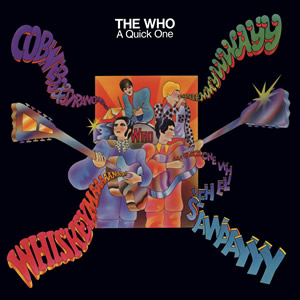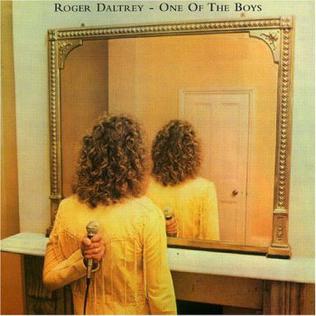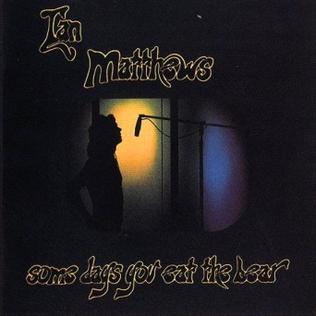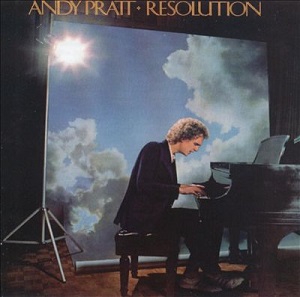
A Quick One is the second studio album by the English rock band the Who, released on 9 December 1966. In the United States, where the song "Happy Jack" was a top 40 hit, the album was released in April 1967 under the title Happy Jack with a slightly altered track listing.

It's Hard is the tenth studio album by English rock band the Who. Released in September 1982, it was the final Who album to feature bassist John Entwistle, who died in 2002. It was also the second and final Who studio album with drummer Kenney Jones, as well as the last to be released on Warner Bros. Records in the US. It was released on Polydor Records in the UK, peaking at No. 11, and on Warner Bros. in the US where it peaked at No. 8 on the Billboard Pop Albums chart. The US rights to both this album and Face Dances subsequently reverted to the band, who then licensed them to MCA Records for reissue. The album achieved gold status by the RIAA in the US in November 1982. It was their last album for over two decades until Endless Wire in 2006.

Who Are You is the eighth studio album by the English rock band the Who, released on 18 August 1978 by Polydor Records in the United Kingdom and on 21 August 1978 by MCA Records in the United States. Although the album received mixed reviews from critics, it was a commercial success, peaking at number 2 on the US charts and number 6 on the UK charts.

Takin' My Time is the third studio album by American musician Bonnie Raitt. It was released in 1973 by Warner Bros. Records. The album is an amalgamation of several different genres, including blues, folk, jazz, New Orleans rhythm and blues, and calypso. The 10 tracks on the album are covers, ranging from soft sentimental ballads to upbeat, rhythmic-heavy tracks. Lowell George was originally hired to handle the production, but was ultimately replaced by John Hall when Raitt became unhappy with his production.

Silverbird is the debut solo studio album by English singer-songwriter Leo Sayer. It was originally released in November 1973 by Chrysalis (UK), and Warner Bros. (US). It was co-produced by former British pop teen idol Adam Faith and David Courtney.

Just a Boy is the second album by English singer-songwriter, Leo Sayer, and was released in 1974. It features his interpretations of two songs written by Sayer and David Courtney for the Who's lead vocalist Roger Daltrey's debut album, Daltrey. Sayer's singles "One Man Band" and "Long Tall Glasses" both hit the charts in the UK and around the world. Leo Sayer was now popular in Europe and made many promotional appearances there. He headlined in Paris at the Théâtre des Champs-Élysées, the venue known as the home of his then-hero, mime artist Marcel Marceau.

Beautiful Loser is the eighth studio album by American rock artist Bob Seger, released in 1975. This album marked Seger's return to Capitol Records after a four-year split. His previous record with Capitol was Brand New Morning in 1971.

Meaty Beaty Big and Bouncy is a compilation album of singles by English rock band the Who, released in 1971 as Track 2406 006 in the UK and as Decca DL 79184 in the US. It entered the US Billboard 200 chart on 20 November 1971, peaking at number 11, and the UK chart on 3 December 1971, peaking at number 9.

Odds & Sods is an album of studio outtakes by British rock band the Who. It was released by Track Records in the UK on September 28, 1974, and by Track/MCA in the US on October 12, 1974. Ten of the recordings on the original eleven-song album were previously unreleased. The album reached No. 10 on the UK charts and No. 15 in the US.

Daltrey is the debut solo studio album by the English rock singer Roger Daltrey, lead vocalist of the Who. It was released on 20 April 1973 by Track Records in the United Kingdom and MCA Records in the United States. Daltrey was the third member of the group to make a solo album. The bulk of the record was written by David Courtney and Leo Sayer. It took six weeks to record during January and February 1973. Sessions took place at Daltrey's Barn Studio, Burwash, East Sussex, where the backing tracks were laid down; vocals, overdubs, and mixing was completed at the Beatles' Apple Studios at 3 Savile Row, and at Nova Sound Studios.

10cc is the debut album by the British rock band 10cc, first released in 1973. It was recorded at Strawberry Studios in Stockport, which was part-owned by guitarist and engineer Eric Stewart, and released on Jonathan King's UK Records label. The album reached number 36 in the UK Albums Chart.
Andy Pratt is an American rock singer, songwriter and multi-instrumentalist. In the 1970s, he made a number of experimental records, of which "Avenging Annie" was a commercial hit.

The Kids Are Alright is a soundtrack album by the British rock band the Who, a companion to the band's documentary film of the same name. As a compilation album, it serves as a retrospective look at the band's biggest hits throughout their career to the point it was released. Most of the tracks are live recordings, rather than the original studio versions.

One of the Boys is the third solo studio album by the Who's lead vocalist, Roger Daltrey. It was released in 1977, on Polydor in the UK, and MCA in the US. The sessions were recorded at the Who's Ramport Studios during the winter of 1976, and Daltrey allowed students from the local Battersea technical school to film them as an educational project. This also marked the first time that Daltrey had written or co-written a song since "Here for More" in 1970, and Lisztomania in 1975. Daltrey's original choice for producers were Jerry Leiber and Mike Stoller, but they declined.

Some Days You Eat the Bear and Some Days the Bear Eats You is the 1974 album by country rock/folk rock musician Ian Matthews.

Say It Ain't So is the second studio album by Murray Head. It was released in 1975 on A&M Records. The album was produced by Paul Samwell-Smith, and the album features sleeve photography by Gered Mankowitz.
"Tattoo" is a song written by Pete Townshend that was first released by The Who on their 1967 album The Who Sell Out. A "rite of passage" song, "Tattoo" tells the story of two teenaged brothers who decide to get tattoos in their attempts to become men. Themes of the song include peer pressure to conform and young men's insecurity about their manhood. The song has been heavily praised by critics and has appeared on several of The Who's live and compilation albums. It has also been covered by Tommy Keene and Petra Haden.

Loretta Lynn's Greatest Hits, Vol. II is a compilation album by American country music singer-songwriter Loretta Lynn. It was released on May 13, 1974, by MCA Records. The album is made up of Lynn's biggest hits between 1968 and 1973.

Cosmic Wheels is the tenth studio album, and eleventh album overall, by Scottish singer-songwriter Donovan. It was released in both the UK and the US in March 1973.

Resolution is the third studio album by American singer-songwriter Andy Pratt, released in 1976 by Nemperor, and distributed by Atlantic. It was Pratt's first album of entirely new music since his second Andy Pratt in 1973. The album was produced by Bee Gees producer Arif Mardin, who was recruited for a more commercial approach.

















